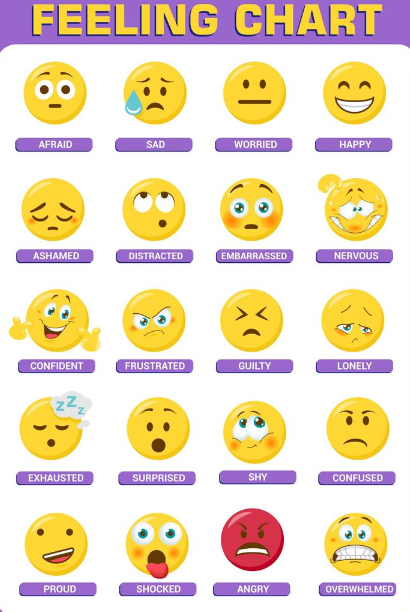BOURSESSENEGAL – Emotions shape our experiences, influence our decisions, and guide our interactions. Understanding the different emotions we feel can enhance our emotional intelligence and improve our mental well-being. In this comprehensive guide, we will explore a wide range of emotions, their significance, and how they impact our lives. By the end, you will have a clearer understanding of your emotional landscape and tools to navigate it effectively.
What Are Emotions?
The Nature of Emotions
Emotions are complex psychological states that include subjective experiences, physiological responses, and behavioral or expressive responses. They arise in reaction to events or thoughts, helping us process our experiences. Each emotion serves a purpose, providing valuable information about our needs and environment.
The Importance of Recognizing Emotions
Recognizing different emotions is essential for personal growth. It helps us understand ourselves better and fosters empathy toward others. When we can identify our feelings, we can communicate more effectively, manage stress, and enhance our relationships.
A Comprehensive List of Different Emotions
To help you navigate your emotional landscape, let’s explore various different emotions categorized into basic and complex feelings.
Basic Emotions
Basic emotions are universal and form the foundation of our emotional experience. Here are the primary ones:
Joy
Joy is a positive emotion that stems from experiences of happiness and satisfaction. It can arise from simple pleasures, accomplishments, or connection with others. Joy encourages social bonding and contributes to overall well-being.
Sadness
Sadness often follows loss or disappointment. It can feel heavy, yet it plays a crucial role in processing grief and seeking support. Acknowledging sadness allows for healing and growth.
Fear
Fear serves as a survival mechanism. It alerts us to danger and prepares our bodies for fight-or-flight responses. While fear can be paralyzing, it can also motivate us to avoid risky situations or challenges.
Anger
Anger arises from perceived threats or injustices. It can energize us to confront issues, but uncontrolled anger may lead to destructive behaviors. Learning to express anger constructively is vital.
Disgust
Disgust is a response to something deemed offensive or harmful, often relating to food or moral violations. It helps protect us from toxins and influences our moral judgments.
Surprise
Surprise can be positive or negative, arising from unexpected events. This emotion prompts us to reassess situations and adapt to changes quickly.
Complex Emotions
Complex emotions result from combinations of basic feelings and can be more nuanced. Here are some examples:
Love
Love encompasses deep affection and attachment, whether romantic, platonic, or familial. It fosters connection and enriches our lives, promoting emotional fulfillment.
Guilt
Guilt arises when we believe we have violated our moral standards or hurt someone. It can be uncomfortable, but it often motivates us to make amends and change our behavior.
Shame
Shame involves feelings of worthlessness or inadequacy. Unlike guilt, which focuses on actions, shame targets the self. Managing shame constructively is crucial for mental health.
Envy
Envy occurs when we desire what others possess. While it can spur motivation, unchecked envy may lead to resentment and negativity.
Pride
Pride stems from accomplishments and can boost self-esteem. However, excessive pride may lead to arrogance and a lack of empathy for others.
Anxiety
Anxiety is a response to perceived threats, often characterized by worry and apprehension about future events. While a certain level of anxiety can motivate us, excessive anxiety can hinder performance and well-being.
The Impact of Different Emotions on Our Lives
Emotional Awareness
Understanding different emotions is vital for emotional awareness. By recognizing our feelings, we gain insight into our thoughts and behaviors. For instance, identifying feelings of frustration can prompt us to address underlying issues rather than react impulsively.
Emotional Regulation
Emotional regulation involves managing our feelings in healthy ways. Techniques for regulating emotions include mindfulness, deep breathing, and journaling. By employing these strategies, we can respond to thoughtfully rather than reactively.
Building Relationships
Emotions significantly influence our relationships. When we understand our own and those of others, we can communicate more effectively. Empathy, for example, allows us to connect with others’ feelings, fostering stronger bonds and reducing conflicts.
How to Manage Different Emotions
Practicing Mindfulness
Mindfulness encourages being present and aware of our emotions without judgment. This practice helps us observe our feelings without becoming overwhelmed. By practicing mindfulness, we develop a healthier relationship with our.
Journaling
Writing about our feelings can provide clarity and insight. Journaling allows us to explore complex emotions and identify patterns in our emotional responses. Over time, this practice enhances emotional awareness and regulation.
Seeking Support
Talking about our emotions with trusted friends or professionals can provide valuable perspectives. Supportive relationships help us process feelings and find constructive solutions to emotional challenges.
Developing Coping Strategies
Finding healthy coping mechanisms is essential for managing emotions. This might include physical activity, creative outlets, or relaxation techniques. Engaging in activities that bring joy can counteract negative and enhance overall well-being.
Conclusion: Embracing the Full Spectrum of Emotions
Understanding the different emotions we experience is essential for personal growth and well-being. Emotions inform our actions and shape our experiences, making emotional awareness critical for navigating life effectively.
By recognizing and managing our feelings, we can improve our relationships, enhance our mental health, and lead more fulfilling lives. Embrace the full spectrum of , learn from your experiences, and use them as tools for growth. This journey toward emotional understanding will enrich your life and strengthen your connections with others. Take the time to explore your , and watch how it transforms your life for the better!
REFERENCE : https://www.health.com/



